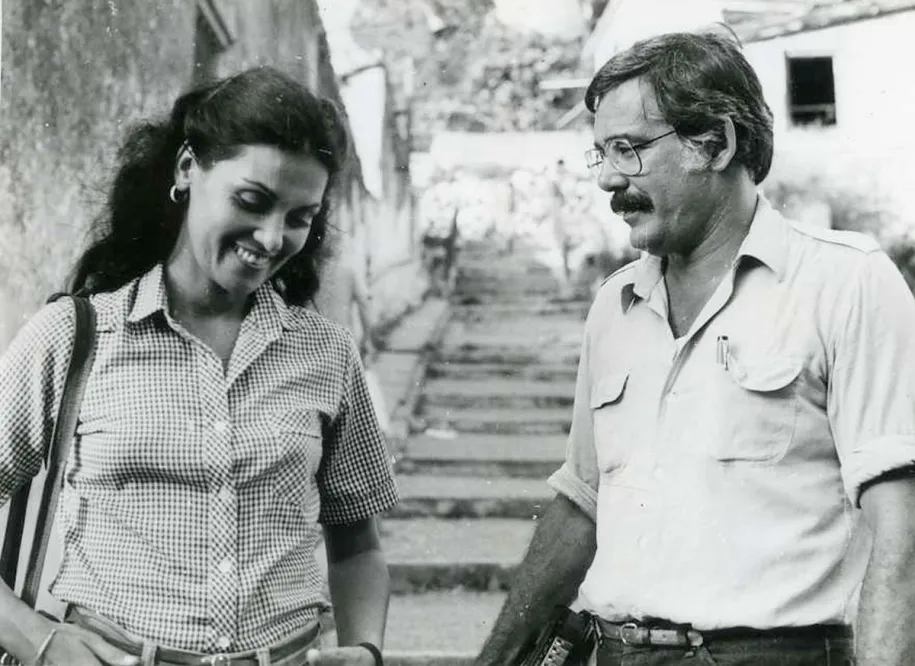「ある程度まで」の裏に隠された物語を解き明かす“
1985年のキューバ映画 ある程度まで (ある時点まで)は、キューバ社会における性別の戦いを鋭く風刺的に描いている。物語は、マッチョイズムという社会問題を調査する教養あるリベラルな映画監督オスカルが、大胆で先駆的な女性港湾労働者であるリナに予期せず恋に落ちるというもの。彼らの関係は、優しくもユーモアに満ちており、キューバの社会主義時代における根強い男性的支配と女性解放の新たなイメージの間の緊張を解きほぐしていく。.
この物語は、オスカーがリナへの愛と妻への忠誠心の間で葛藤するという、魅力的な緊張感を生み出している。この映画は、個人的な愛のジレンマを提示するだけでなく、より広く、深く根強く変化に抵抗する伝統的なジェンダー規範と、キューバの社会政策によって奨励されたジェンダー平等という理想的な夢との間の社会的な闘争を反映している。この対立こそが、『ある程度まで』を、1980年代半ばのキューバにおける文化的課題を映し出すユニークな鏡としているのである。.
主要なテーマとコンテンツ警告
- 配偶者の不貞と裏切り
- 感情的な操作とガスライティング
- 構造的な性差別とマッチョイズム
この映画は、成熟した複雑な心理的テーマに取り組み、親密な関係における感情的な葛藤や、より広い社会の期待に対する洞察に満ちた探求を提供している。.
歴史的背景:キューバにおけるマチスモとジェンダー解放
The concept of マッチズモ キューバだけでなく、ラテンアメリカの多くの文化において長い歴史を持つ、女性に対する支配や明確な性別役割の順守と結びついた、たくましく伝統的な男性性です。しかし、20世紀のキューバ独自の政治的、社会的状況は、これらの家父長制的な規範に対する重要な均衡をもたらしました。男女平等推進の取り組みはキューバ革命のプロジェクトに組み込まれ、産業、政治、教育への女性の参加を奨励しました。.
このような背景から、「ある程度まで」は、進化する理想と根強い慣習との間の緊張を反映した文化的産物として登場します。女性のドック労働者であるリナの役割は、こうした社会変化の精神を捉えています。歴史的に男性が支配してきたドックでの仕事は、経済的な必要性と女性のエンパワーメントの両方を象徴していました。.
キューバ社会におけるジェンダー役割の進化
| Period | ジェンダー規範 | 社会の変化 |
|---|---|---|
| 革命前のキューバ(1959年以前) | 伝統的なマッチョイズムが支配的で、女性は主に家庭での役割に追いやられている。. | 労働力と政治における女性の機会が限られている。. |
| 革命後の1960年代~1980年代 | 政府は、女性の平等と公共生活への参加を促進しています。. | 女性は港湾労働、教育、政治などの分野に進出します。. |
| 現代的な考察(1980年代半ば) | 根強い社会的なマッチョイズムが、高まりつつあるフェミニストの理想と衝突している。. | 映画のような文化的表現は、現在進行形のジェンダー闘争を浮き彫りにする。. |
より広範な影響と現代的意義
文化的な遺物として、この映画は1980年代のキューバ社会を覗き見る窓を提供するだけでなく、ジェンダーの力学や社会変革といった普遍的なテーマを反映しています。旅行者や文化愛好家にとって、このような物語は、社会状況がどの目的地の日常生活や人間関係をどのように形作っているかの理解を深めます。活気に満ちた沿岸都市、賑やかな港、豊かな文化史を持つキューバは、ビーチやマリーナをはるかに超えた探求を誘います。.
Why This Matters to Boating and Sailing Enthusiasts
映画自体は海洋生物やボートに関するものではありませんが、その舞台設定(港湾労働者や港湾文化を強調している点)は、間接的にセーリングやヨットの世界と繋がっています。港やマリーナは、ボートやスーパーヨットの拠点であるだけでなく、文化や社会生活が絡み合う空間でもあります。現地の文化や歴史を理解することは、キューバの海を探索する体験を豊かにします。海岸沿いをセーリングするにしても、港をチャーターするにしても、同様です。ドックで働く人々の回復力と物語は、あらゆる航海に人間味を加えます。.
感情と社会の潮流
船乗りが予測不能な海の要素を乗りこなすように、「Hasta Cierta Punto」は、感情と社会の複雑さが渦巻く荒波の中を視聴者を導きます。登場人物たちの相互作用は、個人的な関係と、より広範な社会変革の潮流の中で直面する挑戦の満ち引きを映し出しています。.
最終的な考えと今後の展望
“「ある程度のところまで」は、キューバ映画が重要な社会問題に大胆に取り組んだ説得力のある例である。ユーモアと哀愁を通して、イデオロギー的な約束と個人的な緊張の時代におけるジェンダー役割の困難な領域を切り開いている。その今日の妥当性は、社会的な期待と平等に向けた永続的な闘争について考察を促すことにある。これらのテーマは、多様な個人間の協力が不可欠な海洋コミュニティを含め、世界のどこでも共鳴する。.
キューバの沿岸生活に魅了され、活気に満ちた海とマリーナを探求したい方へ, ゲットボート・ドットコム セーリングボートやヨットのレンタルに国際的なマーケットプレイスを提供します。ターコイズブルーの湾に沿った穏やかなセーリング、釣りの冒険、豪華なスーパーヨット体験など、プラットフォームは、文化、歴史、そして潮風に乗せて囁かれるコミュニティライフに富んだ目的地と直接触れ合う道を開きます。.
Key Takeaways:
- “「ある程度まで」は、1980年代のキューバにおける男性優位主義と女性解放の衝突を探求する。.
- この映画は、社会変革を背景に、個人的な感情的な葛藤を描き出している。.
- キューバのジェンダー力学は、歴史、政治、そして進化する社会的役割によって形作られている。.
- これらの文化的ニュアンスを理解することで、海事観光地の訪問体験が向上します。.
- 現代のキューバにおけるボートやセーリングの旅は、水域だけでなく豊かな文化的背景をも航行する。.

 Cuba’s “Hasta Cierta Punto” – A Satirical Take on Gender Roles in 1980s Cuba">
Cuba’s “Hasta Cierta Punto” – A Satirical Take on Gender Roles in 1980s Cuba">
